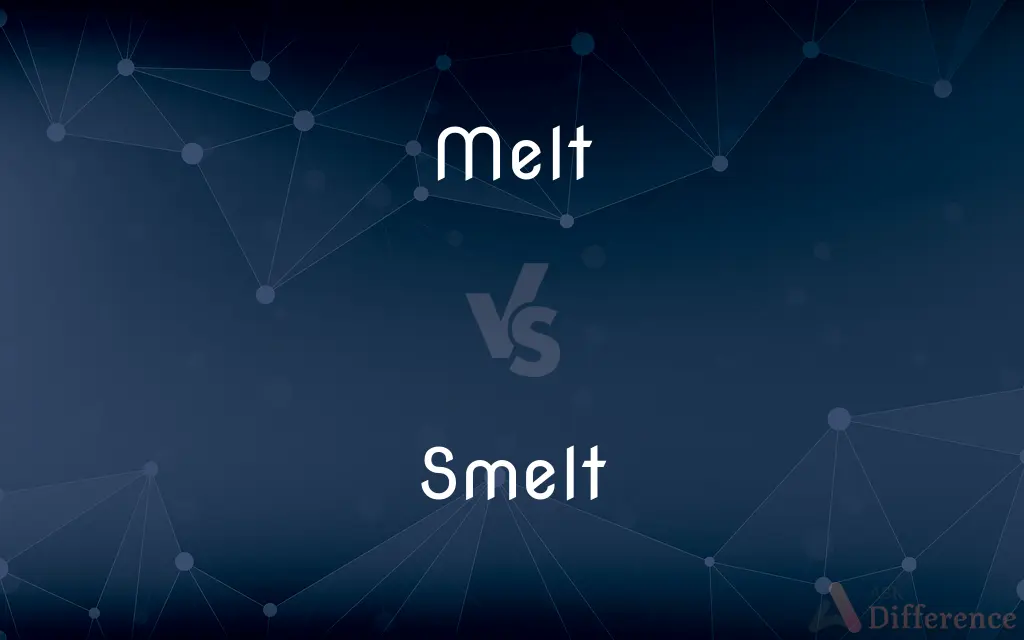Melt vs. Smelt — What's the Difference?
By Tayyaba Rehman & Fiza Rafique — Updated on March 14, 2024
"Melt" refers to the process of changing a substance from solid to liquid due to heat, while "smelt" involves extracting metal from its ore by heating and melting.

Difference Between Melt and Smelt
Table of Contents
ADVERTISEMENT
Key Differences
Melt is a physical process where heat causes a solid substance, like ice, to change its state to a liquid without altering its chemical composition. For instance, ice melts into water when it's warm enough. Smelt, on the other hand, is a metallurgical process used to extract metals from their ores by heating them to a point where the metal liquefies and can be separated from impurities.
While melting is a general process applicable to any solid substance that can change to liquid form when heated, smelting is specifically used in the context of metal processing and involves not just heating, but often chemical changes to remove impurities. For example, smelting iron ore involves heating the ore in a furnace to remove the oxygen and other impurities, leaving behind pure iron.
The tools and environments for melting and smelting also differ significantly. Melting can occur in everyday situations, such as ice melting in a glass of water, and requires only a heat source. Smelting, however, requires specialized equipment like furnaces or smelters and is typically done in industrial settings.
Understanding the difference between melting and smelting is crucial in fields like materials science, metallurgy, and environmental science, as each process has different implications for the properties of the substances involved and their impact on the environment.
Comparison Chart
Definition
The process of a solid becoming a liquid through the application of heat.
The process of extracting metal from its ore by heating and melting.
ADVERTISEMENT
Context
General, applicable to any solid substance.
Specific to metallurgy and metal extraction.
Chemical Change
No chemical change; a physical change in state.
Often involves chemical changes to remove impurities.
Tools/Environment
Simple heat source; can occur in everyday situations.
Requires furnaces or smelters; typically industrial.
Example
Ice melting into water.
Extracting iron from iron ore in a blast furnace.
Compare with Definitions
Melt
To change from a solid to a liquid state usually by heat.
The ice cream started to melt in the sun.
Smelt
Can refer to the smelting process in various industries.
Smelting iron requires high temperatures and a blast furnace.
Melt
In cooking, to liquefy by heat.
Melt the butter in the pan before adding the eggs.
Smelt
To extract metal from ore by heating.
They smelted copper from the ore they mined.
Melt
Used metaphorically to describe a softening in feeling.
His heart melted when he saw the puppy.
Smelt
Has a historical significance in the development of human civilization.
The discovery of smelting was a major step in the Bronze Age.
Melt
The process of dissolving or disappearing.
The tension in the room seemed to melt away.
Smelt
Involves the use of a flux to facilitate the removal of impurities.
Limestone is often used as a flux in the smelting process.
Melt
To blend or merge smoothly.
The colors of the sunset melted together in a beautiful display.
Smelt
Can lead to environmental impacts due to the release of gases.
Smelting plants need to manage emissions to minimize environmental damage.
Melt
Make or become liquefied by heat
The hot metal melted the wax
Place under a hot grill until the cheese has melted
Smelt
To melt or fuse (ores) in order to separate the metallic constituents.
Melt
Make or become more tender or loving
She was so beautiful that I melted
Richard gave her a smile that melted her heart
Smelt
To melt or fuse. Used of ores.
Melt
Leave or disappear unobtrusively
The compromise was accepted and the opposition melted away
Smelt
A past tense and a past participle of smell.
Melt
An act or period of melting
The precipitation falls as snow and is released during the spring melt
Smelt
Any of various small silvery marine, freshwater, and anadromous food fishes of the family Osmeridae, found in cold waters of the Northern Hemisphere, especially Osmerus mordax of North America and O. eperlanus of Europe.
Melt
To be changed from a solid to a liquid state especially by the application of heat.
Smelt
Any small anadromous fish of the family Osmeridae, found in the Atlantic and Pacific Oceans and in lakes in North America and northern part of Europe.
Melt
To dissolve
Sugar melts in water.
Smelt
(obsolete) A fool; a simpleton.
Melt
To disappear or vanish gradually as if by dissolving
The crowd melted away after the rally.
Smelt
Production of metal, especially iron, from ore in a process that involves melting and chemical reduction of metal compounds into purified metal.
Melt
To pass or merge imperceptibly into something else
Sea melted into sky along the horizon.
Smelt
Any of the various liquids or semi-molten solids produced and used during the course of such production.
Melt
To become softened in feeling
Our hearts melted at the child's tears.
Smelt
Simple past tense and past participle of smell
Melt
(Obsolete) To be overcome or crushed, as by grief, dismay, or fear.
Smelt
To fuse or melt two things into one, especially in order to extract metal from ore; to meld.
Melt
To change (a solid) to a liquid state especially by the application of heat.
Smelt
Any one of numerous species of small silvery salmonoid fishes of the genus Osmerus and allied genera, which ascend rivers to spawn, and sometimes become landlocked in lakes. They are esteemed as food, and have a peculiar odor and taste.
Melt
To dissolve
The tide melted our sand castle away.
Smelt
A gull; a simpleton.
Melt
To cause to disappear gradually; disperse.
Smelt
To melt or fuse, as, ore, for the purpose of separating and refining the metal; hence, to reduce; to refine; to flux or scorify; as, to smelt tin.
Melt
To cause (units) to blend
"Here individuals of all races are melted into a new race of men" (Michel Guillaume Jean de Crèvecoeur).
Smelt
Small cold-water silvery fish; migrate between salt and fresh water
Melt
To soften (someone's feelings); make gentle or tender.
Smelt
Small trout-like silvery marine or freshwater food fishes of cold northern waters
Melt
A melted solid; a fused mass.
Smelt
Extract (metals) by heating
Melt
The state of being melted.
Melt
The act or operation of melting.
Melt
The quantity melted at a single operation or in one period.
Melt
A usually open sandwich topped with melted cheese
A tuna melt.
Melt
Molten material, the product of melting.
Melt
The transition of matter from a solid state to a liquid state.
Melt
The springtime snow runoff in mountain regions.
Melt
A melt sandwich.
Melt
(geology) Rock showing evidence of having been remelted after it originally solidified.
Numerous samples of breccia and impact melts were recovered by drilling into the floor of the crater.
Melt
A wax-based substance for use in an oil burner as an alternative to mixing oils and water.
Melt
An idiot.
Melt
(ergative) To change (or to be changed) from a solid state to a liquid state, usually by a gradual heat.
I melted butter to make a cake.
When the weather is warm, the snowman will disappear; he will melt.
Melt
To dissolve, disperse, vanish.
His troubles melted away.
Melt
To soften, as by a warming or kindly influence; to relax; to render gentle or susceptible to mild influences; sometimes, in a bad sense, to take away the firmness of; to weaken.
Melt
(intransitive) To be discouraged.
Melt
To be emotionally softened or touched.
She melted when she saw the romantic message in the Valentine's Day card.
Melt
To be very hot and sweat profusely.
I need shade! I'm melting!
Melt
See 2d Milt.
Melt
To reduce from a solid to a liquid state, as by heat; to liquefy; as, to melt wax, tallow, or lead; to melt ice or snow.
Melt
To soften, as by a warming or kindly influence; to relax; to render gentle or susceptible to mild influences; sometimes, in a bad sense, to take away the firmness of; to weaken.
Thou would'st have . . . melted down thy youth.
For pity melts the mind to love.
Melt
To be changed from a solid to a liquid state under the influence of heat; as, butter and wax melt at moderate temperatures.
Melt
To dissolve; as, sugar melts in the mouth.
Melt
To be softened; to become tender, mild, or gentle; also, to be weakened or subdued, as by fear.
My soul melteth for heaviness.
Melting with tenderness and kind compassion.
Melt
To lose distinct form or outline; to blend. See fondue.
The soft, green, rounded hills, with their flowing outlines, overlapping and melting into each other.
Melt
To disappear by being dispersed or dissipated; as, the fog melts away.
Melt
The process whereby heat changes something from a solid to a liquid;
The power failure caused a refrigerator melt that was a disaster
The thawing of a frozen turkey takes several hours
Melt
Reduce or cause to be reduced from a solid to a liquid state, usually by heating;
Melt butter
Melt down gold
The wax melted in the sun
Melt
Become or cause to become soft or liquid;
The sun melted the ice
The ice thawed
The ice cream melted
The heat melted the wax
The giant iceberg dissolved over the years during the global warming phase
Dethaw the meat
Melt
Become more relaxed, easygoing, or genial;
With age, he mellowed
Melt
Lose its distinct outline or shape; blend gradually;
Hundreds of actors were melting into the scene
Melt
Become less clearly visible or distinguishable; disappear gradually or seemingly;
The scene begins to fade
The tree trunks are melting into the forest at dusk
Melt
Become less intense and fade away gradually;
Her resistance melted under his charm
Common Curiosities
Can melting occur at room temperature?
Yes, if the room temperature is above the melting point of the substance, such as ice melting to water.
How has smelting contributed to technological advancements?
Smelting has been crucial in producing metals for tools, machinery, and infrastructure, driving technological and industrial progress.
Is smelting a type of recycling process?
Smelting can be part of recycling metals, where scrap metal is melted and impurities removed to reuse the metal.
What role does flux play in smelting?
Flux helps to remove impurities from the ore during smelting, making the process more efficient.
What is the basic difference between melting and smelting?
Melting is the physical transition of a substance from solid to liquid with heat, while smelting is a metallurgical process to extract metal from ore, involving heat and often chemical reactions.
Does smelting always involve the use of a furnace?
Yes, smelting typically requires a furnace or smelter to reach the high temperatures needed for the process.
Can melting occur without any change in the chemical composition of a substance?
Yes, melting is a physical change and does not alter the chemical composition of the substance.
Are there environmental concerns associated with smelting?
Yes, smelting can release harmful gases and pollutants, posing environmental and health risks.
Can the process of melting be reversed?
Yes, by cooling the liquid below its freezing point, the melted substance can solidify, reversing the melting process.
What are some applications of melting in everyday life?
Melting is used in cooking, like melting butter or chocolate, and in manufacturing processes like molding plastics or metals.
Share Your Discovery

Previous Comparison
Haha vs. Hehe
Next Comparison
Summary vs. RecapAuthor Spotlight
Written by
Tayyaba RehmanTayyaba Rehman is a distinguished writer, currently serving as a primary contributor to askdifference.com. As a researcher in semantics and etymology, Tayyaba's passion for the complexity of languages and their distinctions has found a perfect home on the platform. Tayyaba delves into the intricacies of language, distinguishing between commonly confused words and phrases, thereby providing clarity for readers worldwide.
Co-written by
Fiza RafiqueFiza Rafique is a skilled content writer at AskDifference.com, where she meticulously refines and enhances written pieces. Drawing from her vast editorial expertise, Fiza ensures clarity, accuracy, and precision in every article. Passionate about language, she continually seeks to elevate the quality of content for readers worldwide.














































